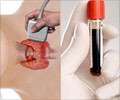A new study suggests that levothyroxine sodium is being prescribed to boost the thyroid function even among patients with borderline high levels of the thyroid-stimulating hormone thyrotropin.

Researchers note that while thyroid function testing has increased, likely resulting in detection of more cases, an additional factor contributing to more prescriptions of thyroid medication may be the lowering of the thyrotropin threshold at which levothyroxine treatment is started in patients. If the increase in prescriptions is due to a lower threshold for treatment, then treatment may result in less benefit and more harm. Overtreatment is associated with an increased risk of fractures and atrial fibrillation (abnormal heart beat), according to researchers.
Peter N. Taylor, M.Sc., M.R.C.P., of the Cardiff University School of Medicine, United Kingdom, and colleagues examined trends in thyrotropin levels before and after levothyroxine therapy. Researchers used data from the United Kingdom Clinical Practice Research Datalink and identified 52,298 patients who received a levothyroxine prescription between 2001 and 2009.
American Thyroid Association guidelines recommend considering levothyroxine therapy at thyrotropin levels of 10 mIU/L or less when there are clear symptoms of hypothyroidism, positive thyroid autoantibodies or evidence of atherosclerotic cardiovascular disease (hardening of the arteries) or heart failure. Treatment of patients with thyrotropin levels at or below 10 mIU/L without symptoms may cause more harm than good and may represent overtreatment.
The study findings indicate that between 2001 and 2009, the median (midpoint) thyrotropin level at the start of levothyroxine treatment declined from 8.7 to 7.9 mIU/L, with an increase in the odds of having levothyroxine therapy start at a thyrotropin level of 10 mIU/L or less.
"In the United Kingdom, 1.6 million individuals are on long-term levothyroxine regimens, most of whom have been prescribed it for primary hypothyroidism. If current practice continues, up to 30 percent of persons receiving levothyroxine therapy may have been prescribed it without an accepted indication and with the potential for net harm if they develop even a low thyrotropin level," the study concludes.
 MEDINDIA
MEDINDIA




 Email
Email










